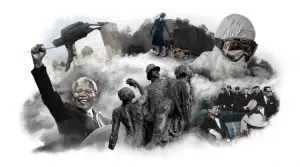
Research on collective recall takes on new importance in a post-fact world.
Strange things have been happening in the news lately. Already this year, members of US President Donald Trump’s administration have alluded to a ‘Bowling Green massacre’ and terror attacks in Sweden and Atlanta, Georgia, that never happened.
The misinformation was swiftly corrected, but some historical myths have proved difficult to erase. Since at least 2010, for example, an online community has shared the apparently unshakeable recollection of Nelson Mandela dying in prison in the 1980s, despite the fact that he lived until 2013, leaving prison in 1990 and going on to serve as South Africa’s first black president.
Memory is notoriously fallible, but some experts worry that a new phenomenon is emerging. “Memories are shared among groups in novel ways through sites such as Facebook and Instagram, blurring the line between individual and collective memories,” says psychologist Daniel Schacter, who studies memory at Harvard University in Cambridge, Massachusetts. “The development of Internet-based misinformation, such as recently well-publicized fake news sites, has the potential to distort individual and collective memories in disturbing ways.”
Collective memories form the basis of history, and people’s understanding of history shapes how they think about the future. The fictitious terrorist attacks, for example, were cited to justify a travel ban on the citizens of seven “countries of concern”. Although history has frequently been interpreted for political ends, psychologists are now investigating the fundamental processes by which collective memories form, to understand what makes them vulnerable to distortion. They show that social networks powerfully shape memory, and that people need little prompting to conform to a majority recollection — even if it is wrong. Not all the findings are gloomy, however. Research is pointing to ways of dislodging false memories or preventing them from forming in the first place.
To combat the influence of fake news, says Micah Edelson, a memory researcher at the University of Zurich in Switzerland, “it’s important to understand not only the creation of these sites, but also how people respond to them”.
Read the rest of the article here
Leave a Reply